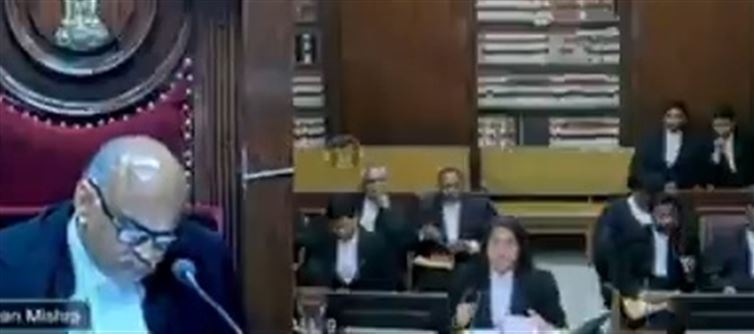
The tweet by sandeep VS State brings to light a contentious legal decision from the madhya pradesh high court that has ignited a fierce debate about the fairness of indian family law. The video, shared for "Legal Awareness & education Purpose only," captures a courtroom scene where Justice Devnarayan Mishra is deliberating on a case involving a woman's claim for maintenance under Section 125 of the Code of criminal Procedure, 1973.
The central issue revolves around whether a man, who is not the biological father of a child, can be compelled to pay maintenance for that child. The tweet's accompanying text expresses outrage, highlighting the perceived injustice of holding a man financially responsible for a child that is not his, without considering the woman's actions or the broader implications of such a ruling.
The Legal and Social Implications of the Judgment
The video frames, accompanied by subtitles, reveal a detailed discussion on the nuances of the case, where the judge questions the entitlement of an illegitimate child to maintenance under the law. The argument presented suggests that even if the mother’s husband is not the biological father, he may still be liable to provide maintenance, a stance that has sparked controversy.
The tweet's criticism extends to the lack of accountability for the woman's alleged deceit, pointing out that the legal system seems to prioritize the child's rights over the man's, regardless of the circumstances leading to the child's birth. This perspective is further emphasized by the tweet's sarcastic tone, thanking prime minister Narendra Modi, Law minister Arjun ram Meghwal, and home minister amit shah, implying that such laws reflect poorly on the current government's approach to gender and family issues.
Public Outcry and Calls for Reform
This tweet has resonated with many, eliciting a range of reactions from outrage to calls for legal reform. The video’s depiction of the courtroom, with lawyers and the judge engaged in serious discourse, contrasts sharply with the public’s perception of the outcome as unjust. The tweet's mention of the case being a "beauty of indian laws" drips with irony, suggesting that such rulings are emblematic of a broader systemic issue where men are disproportionately burdened by financial obligations without due consideration of their rights. This incident has fueled discussions on social media about the need for a reevaluation of maintenance laws, particularly in cases involving non-biological parentage, and has reignited debates on gender equality, accountability, and the role of the judiciary in upholding fairness.
The central issue revolves around whether a man, who is not the biological father of a child, can be compelled to pay maintenance for that child. The tweet's accompanying text expresses outrage, highlighting the perceived injustice of holding a man financially responsible for a child that is not his, without considering the woman's actions or the broader implications of such a ruling.
The Legal and Social Implications of the Judgment
The video frames, accompanied by subtitles, reveal a detailed discussion on the nuances of the case, where the judge questions the entitlement of an illegitimate child to maintenance under the law. The argument presented suggests that even if the mother’s husband is not the biological father, he may still be liable to provide maintenance, a stance that has sparked controversy.
The tweet's criticism extends to the lack of accountability for the woman's alleged deceit, pointing out that the legal system seems to prioritize the child's rights over the man's, regardless of the circumstances leading to the child's birth. This perspective is further emphasized by the tweet's sarcastic tone, thanking prime minister Narendra Modi, Law minister Arjun ram Meghwal, and home minister amit shah, implying that such laws reflect poorly on the current government's approach to gender and family issues.
Public Outcry and Calls for Reform
This tweet has resonated with many, eliciting a range of reactions from outrage to calls for legal reform. The video’s depiction of the courtroom, with lawyers and the judge engaged in serious discourse, contrasts sharply with the public’s perception of the outcome as unjust. The tweet's mention of the case being a "beauty of indian laws" drips with irony, suggesting that such rulings are emblematic of a broader systemic issue where men are disproportionately burdened by financial obligations without due consideration of their rights. This incident has fueled discussions on social media about the need for a reevaluation of maintenance laws, particularly in cases involving non-biological parentage, and has reignited debates on gender equality, accountability, and the role of the judiciary in upholding fairness.




 click and follow Indiaherald WhatsApp channel
click and follow Indiaherald WhatsApp channel